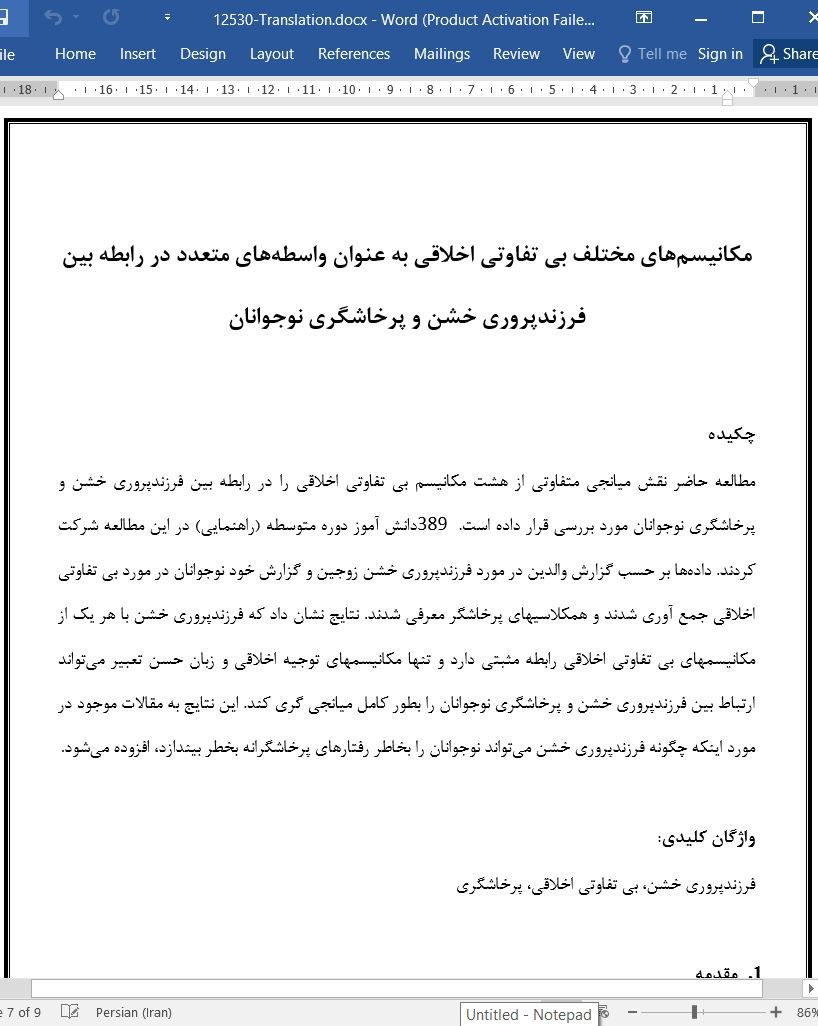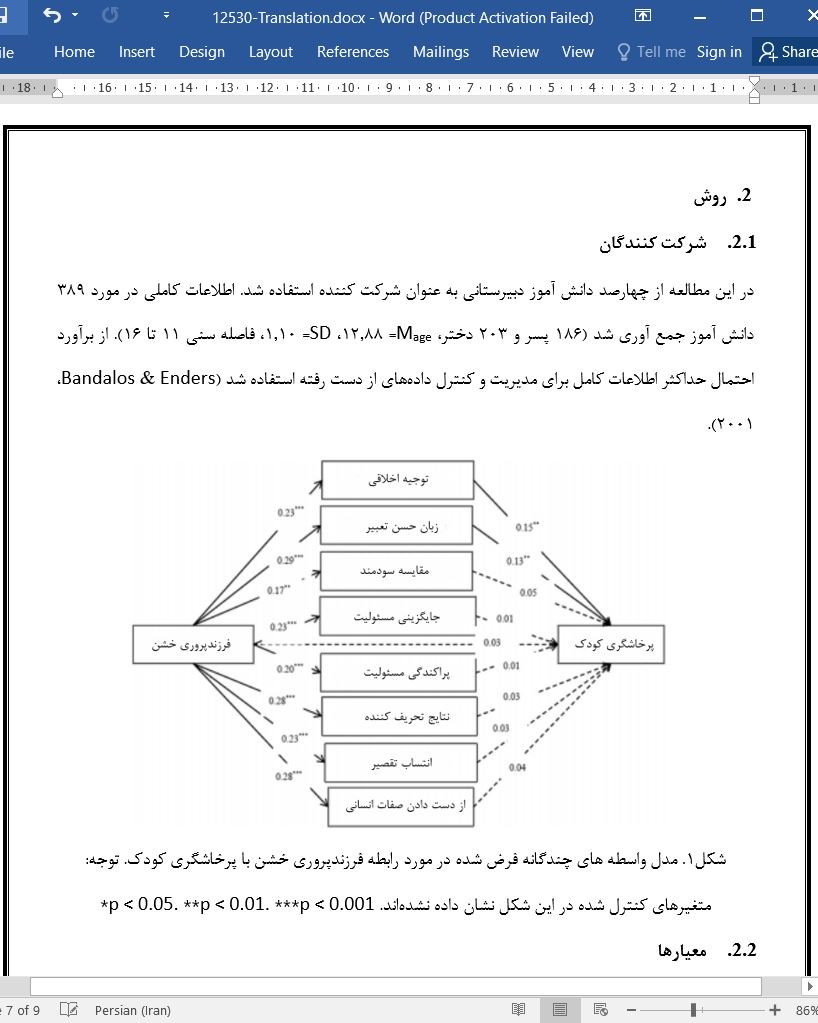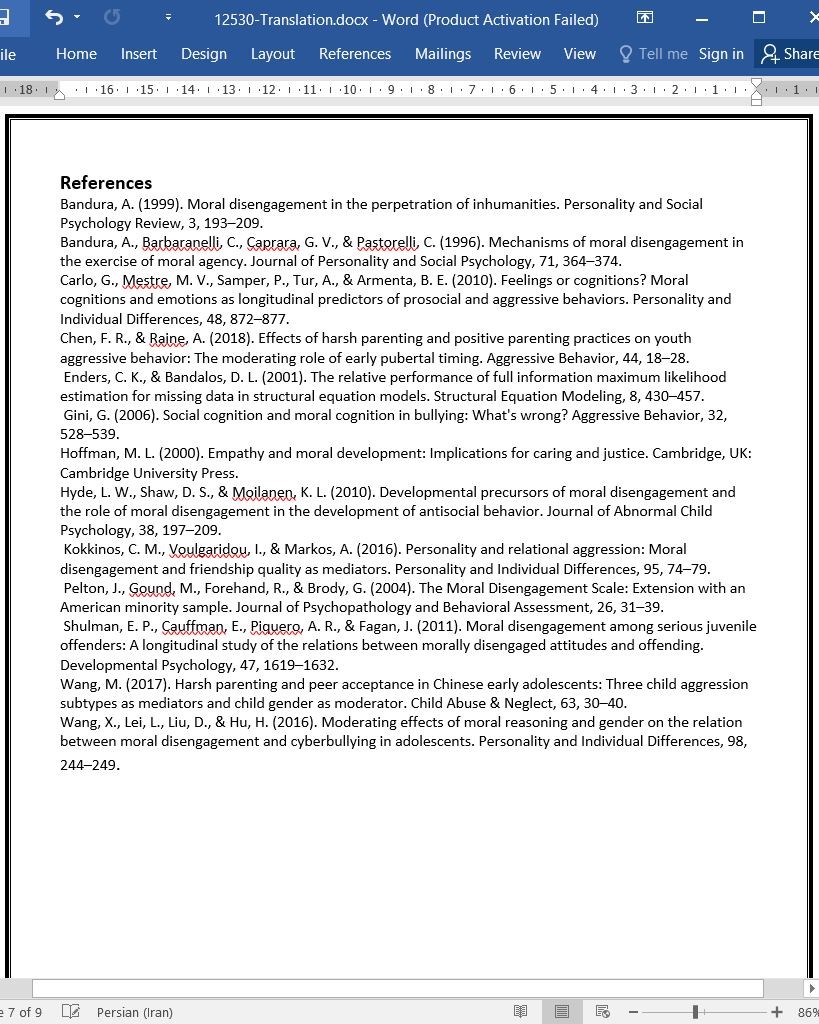
دانلود مقاله مکانیسم های مختلف بی تفاوتی اخلاقی به عنوان واسطه های متعدد در رابطه بین فرزندپروری خشن و پرخاشگری نوجوانان
چکیده
مطالعه حاضر نقش میانجی متفاوتی از هشت مکانیسم بی تفاوتی اخلاقی را در رابطه بین فرزندپروری خشن و پرخاشگری نوجوانان مورد بررسی قرار داده است. 389 دانش آموز دوره متوسطه (راهنمایی) در این مطالعه شرکت کردند. دادهها بر حسب گزارش والدین در مورد فرزندپروری خشن زوجین و گزارش خود نوجوانان در مورد بی تفاوتی اخلاقی جمع آوری شدند و همکلاسیهای پرخاشگر معرفی شدند. نتایج نشان داد که فرزندپروری خشن با هر یک از مکانیسمهای بی تفاوتی اخلاقی رابطه مثبتی دارد و تنها مکانیسمهای توجیه اخلاقی و زبان حسن تعبیر میتواند ارتباط بین فرزندپروری خشن و پرخاشگری نوجوانان را بطور کامل میانجی گری کند. این نتایج به مقالات موجود در مورد اینکه چگونه فرزندپروری خشن میتواند نوجوانان را بخاطر رفتارهای پرخاشگرانه بخطر بیندازد، افزوده میشود.
1. مقدمه
اگرچه تحقیقات نشان دادهاند که فرزندپروری خشن ممکن است کودکان را بخاطر رفتارهای پرخاشگرانه به خطر بیندازد (Chen & Raine، 2018؛ Wang، 2017)، اما مکانیسمهای واسطه شامل در این رابطه باید بیشتر مورد بررسی قرار گیرند. با در نظر گرفتن تأثیر بی تفاوتی اخلاقی بر پرخاشگری کودکان (Gini، 2006؛ Shulman، Cauffman، Piquero، & Fagan، 2011)، ممکن است این انتظار وجود داشته باشد که در صورتیکه فرزندپروری خشن به عنوان یک عامل خطرساز برای بی تفاوتی اخلاقی کودک بکار رود، بی تفاوتی اخلاقی میتواند واسطهای برای رابطه بین فرزندپروری خشن و پرخاشگری نوجوانان باشد. این مطالعه قصد دارد تا نقشهای میانجی مختلف هشت نوع مکانیسم بی تفاوتی اخلاقی را در ارتباط بین فرزندپروری خشن و پرخاشگری نوجوانان مورد بررسی قرار دهد.
4. بحث
این مطالعه با توجه به تحقیقات در مورد رابطه بین فرزندپروری خشن پرخاشگری کودک و چارچوب نظری بی تفاوتی اخلاقی (Bandura و همکاران، 1996)، نقش میانجی هشت مکانیسم بی تفاوتی اخلاقی را مورد بررسی قرار داده است. ما دریافتیم که فرزندپروری خشن یک عامل خطرساز خانوادگی برای هر یک از هشت مکانیسم است. علاوه براین، مشخص شد که فقط توجیه اخلاقی و زبان حسن تعبیر رابطه بین فرزندپروری خشن و پرخاشگری نوجوانان را میانجی گری میکند.
Abstract
The present study examined the different mediating roles of eight mechanisms of moral disengagement in the association between harsh parenting and adolescent aggression. 389 junior high school students participated. Data were collected by parents reporting on spouses' harsh parenting, adolescents themselves reporting on moral disengagement and nominating out aggressive classmates. The results indicated that harsh parenting was positively associated with each mechanism of moral disengagement and only the mechanisms of moral justification and euphemistic language completely mediated the association between harsh parenting and adolescent aggression. These results add to extant literature on how harsh parenting could risk adolescents for aggressive behaviors.
1. Introduction
Although research has indicated that harsh parenting could risk children for aggressive behaviors (Chen & Raine, 2018; Wang, 2017), the mediating mechanisms involved in this relationship remain to be further explored. Taking into account the impact of moral disengagement on child aggression (Gini, 2006; Shulman, Cauffman, Piquero, & Fagan, 2011), one might expect that moral disengagement might mediate the relation of harsh parenting to child aggression if harsh parenting functions as a risk factor for child moral disengagement. This study intends to explore the different mediating roles of the eight types of moral disengagement mechanisms in the association between harsh parenting and adolescent aggression.
4. Discussion
Based on research on the relation of harsh parenting to child aggression and the theoretical framework of moral disengagement (Bandura et al., 1996), this study examined the mediating roles of eight mechanisms of moral disengagement. We found that harsh parenting was a familial risk factor for each of the eight mechanisms. Moreover, only moral justification and euphemistic language were found to mediate the association between harsh parenting and adolescent aggression.
چکیده
1. مقدمه
2. روش
2.1. شرکت کنندگان
2.2. معیارها
2.2.1. فرزندپروی خشن
2.2.2 بی تفاوتی اخلاقی
2.2.3 پرخاشگری کودک
2.2.4 متغیرهای کنترل
2.3 رویهها
3 نتایج
3.2 تحلیلهای مقدماتی
3.3 تحلیلهای مدل واسطه های چندگانه
4 بحث
منابع
ABSTRACT
1. Introduction
2. Method
2.1. Participants
2.2. Measures
2.2.1. Harsh parenting
2.2.2. Moral disengagement
2.2.3. Child aggression
2.2.4. Controll variables
2.3. Procedures
3. Results
3.1. Preliminary analyses
3.2. Analyses of the multiple mediator model
4. Discussion
References
- اصل مقاله انگلیسی با فرمت ورد (word) با قابلیت ویرایش
- ترجمه فارسی مقاله با فرمت ورد (word) با قابلیت ویرایش، بدون آرم سایت ای ترجمه
- ترجمه فارسی مقاله با فرمت pdf، بدون آرم سایت ای ترجمه



